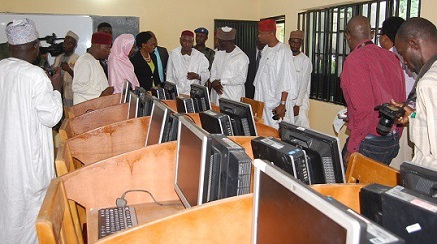News
Etisalat Equips Kano School’s ICT Hub with Computers

Nigeria’s fastest growing and most innovative telecoms operator, Etisalat Nigeria, has given a facelift to the Information and Communication Technology (ICT) centre of Girls’ Government College, Dala, Kano State in North West Nigeria with the donation of 30 pieces of desk top computers.
Professor Hafiz Abubakar, State’s deputy governor and Commissioner for Education, recently unveiled the Centre alongside other facilities renovated by Etisalat in the school as part of its Adopt-A-School initiative, a pan-Nigeria intervention programme aimed at facilitating the delivery of quality education through the creation of conducive learning environment for primary and secondary school students.
Speaking about the intervention programme, Ibrahim Dikko, vice president, Regulatory and Corporate Affairs, Etisalat Nigeria, said the company aims to help drive the delivery of quality education.
“The whole aim is to drive the delivery of quality education. What we have done is to create an enabling environment for conducive learning which in turn drives improvement in learning. As an innovative company, we are about driving sustainable development using education as one of the key platforms, “he said.
Dikko, who was represented by the company’s Head, Government and Community Relations, Mohammed Suley-Yusuf, also reiterated the company’s commitment to partnering with the Kano state government in achieving its developmental goals in critical areas particularly education.
“Etisalat is proud to be able to contribute positively to achieving the government’s objective of improving Kano State especially in the area of Education. We will continue to collaborate to move the state and indeed the nation forward, even as we work towards being the telecommunications partner of choice for Nigeria. We laud Kano State government, for recognising the potential of and encouraging public private partnership, “he said.
Also speaking in his address, Prof. Hafiz Abubakar, Kano State deputy Governor, commended Etisalat for combining its core business function of providing quality telecoms services with strategic contributions to the development of the society in various areas through some initiatives like the Adopt-A-School programme.
He said, “Today, we are witnessing the result of a strategic partnership. We as a people are particularly glad because it is very clear to us that given our population as the most densely populated state in the country, the three tiers of Government cannot single-handedly bear the huge funding burden of education without external support. Therefore, it is very heart-warming to see Etisalat take this initiative of adopting a school for life with the objective of making sure that it brings about positive infrastructural development and enhanced quality of learning through the provision of educational materials.”
The Deputy Governor also noted that the intervention will help the Abdullahi Ganduje-led administration in achieving its objective of ‘providing education for all’ especially for the girl child.
According to him, Kano State needs about 15,000 classrooms in state-owned secondary schools to enable them take in the 30% of secondary school prospects who have not been able to transit to secondary school upon completing primary education.
Beside the ICT Centre, other renovated facilities under the first phase of the project which the deputy Governor commissioned include the school’s library which was fitted with furniture and books, Kwankwaso Hostel Block, a modern science laboratory, solar-powered potable water facility and seven classrooms with chairs and tables.
News
AfDB Supports Francophone Africa Start-ups with €6.5M

The African Development Bank Group last week approved an investment of €6.5 million in the Saviu II fund in order to support technology start-ups through their seed phase and first institutional fundraising, mainly in French-speaking Central and West Africa.

The Bank will invest €4.5 million as equity and €2 million as a first-loss hedging tranche on behalf of the European Commission, under the Boost Africa Programme.
This participation of the Bank Group will enable the Saviu II fund to give priority to companies with a strong technological or digital component.
Saviu II, the second investment vehicle of Saviu Partners, plans to invest between €500,000 and €3 million in about 20 technology or technology-oriented business-to-business start-ups in the seed phase or carrying out first institutional fundraising.
The Saviu II venture capital fund aims to make at least 60% of its commitments in the French-speaking countries of West and Central Africa: Côte d ‘Ivoire, Cameroon, Benin, Senegal, Togo, Burkina Faso and Mali.
The fund can also co-invest in promising technology companies in East Africa that have a strong team and business model, and whose strategy includes entering the market in French-speaking West African countries and establishing a strong presence there.
In addition, the fund will devote a dedicated envelope to pre-seed investments, focusing on minority equity investments, usually in co-investment with studios, incubators or other ecosystem partners.
News
Nigeria Inks $1.3bn MoU with AFC for Alumina Refinery, Mining Push

Nigerian Government has signed a $1.3 billion Memorandum of Understanding (MoU) with Africa Finance Corporation (AFC) via the Solid Minerals Development Fund (SMDF) to fund an alumina refinery, national geoscience mapping, and a strategic investment vehicle for mining growth.

Special Assistant to the Minister of Solid Minerals Development, Segun Tomori, said the refinery will process one million tonnes of bauxite yearly using a modern Bayer process, powered by an on-site gas-fired cogeneration plant.
Minister Dele Alake called it a transformative milestone boosting GDP, aligning with reforms that improve investment climate, regulations, and licensing to attract private capital. He directed agencies to fast-track permits.
The 20-year project at 95% utilization eyes 19 million tonnes total output, $1.2 billion annual GDP addition, $25 billion economic impact, and $8 billion forex earnings, per feasibility studies.
SMDF Executive Secretary Fatima Shinkafi termed it the agency’s biggest funding deal, supporting value-addition policy.
The partnership extends to geoscience mapping for mineral data, de-risking exploration, and a joint vehicle for mining assets.
Permanent Secretary Engr. Farouk Yabo praised the reforms. Shinkafi signed for government; AFC’s Franklin Edochie for the corporation, witnessed by AFC CEO Samaila Zubairu.
Tomori positioned it as Nigeria’s largest private mining investment and FDI magnet.
News
TeamApt, Awabah Partner to Boost Pension Drive for Nigerians

TeamApt Ltd., a subsidiary of Moniepoint Inc. and a leading financial infrastructure provider, has partnered with Awabah, the National Pension Commission’s first licensed Accredited Pension Agent, to expand pension access for millions of Nigerians in the informal economy.

The partnership was unveiled in Abuja at the launch of Awabah’s agent licence, themed “Building Financial Resilience: Securing the Future with Personal Pensions.”
At the event, PenCom Director-General Omolola Oloworaran underscored a major imbalance in Nigeria’s pension system, noting that while pension assets have grown to over ₦27 trillion, the benefits remain largely concentrated among formal-sector workers. She observed that most informal-sector workers—who make up the majority of Nigeria’s workforce—still retire without any form of savings.
This challenge is further highlighted in Moniepoint’s 2025 Informal Economy Report, which reveals that although 65 per cent of informal businesses recorded revenue growth, most lack the structural resilience required for long-term sustainability and succession.
Through the partnership, TeamApt—a Central Bank of Nigeria–licensed switching and processing company—will enable seamless pension registration and contributions for Awabah users via its Direct Debit service on Point of Sale (POS) terminals nationwide. Informal workers can enrol for personal pensions, tokenize their cards, and automate periodic contributions in just a few steps.
The initiative simplifies pension savings by turning what was once a complex, bureaucratic process into a routine transaction, enabling business owners and workers to build financial security beyond their productive years.
“When we started Awabah, we were driven by one core belief—that no African worker should be one accident or crisis away from poverty,” said Tunji Andrews, Chief Executive Officer of Awabah.
“This partnership with TeamApt allows us to scale that vision. By leveraging their Direct Debit service and extensive POS network, we are meeting informal workers where they already operate—markets, workshops, kiosks, and roadside businesses. With small, regular contributions, workers can now access personal pensions bundled with health, accident, and life insurance,” he added.
TeamApt CEO Dennis Ajalie said the collaboration aligns with the company’s long-standing mission to power Nigeria’s informal economy.
“At TeamApt and Moniepoint Inc., our focus has always been on enabling the informal sector,” Ajalie said. “Today, working within our licence framework and alongside our co-subsidiary, Moniepoint Microfinance Bank, we operate across all 774 local government areas, serving millions of Nigerians who drive economic activity.”
He described the partnership as a critical step toward pension inclusion, adding that it demonstrates how financial infrastructure can deliver real, long-term value to everyday Nigerians.
Ajalie also praised PenCom’s leadership for creating an enabling environment for innovation, noting that Oloworaran’s reforms have opened the door for partnerships capable of delivering sustainable pension coverage for informal workers.
The initiative is powered by TeamApt’s robust financial technology ecosystem, which has supported banks, fintechs, and financial institutions for more than a decade. Its omni-channel Direct Debit service allows automated recurring collections—such as pension contributions, subscriptions, and repayments—directly from customers’ bank accounts with their consent.
Beyond pensions, the platform enables informal workers to automate investments in the capital market, access healthcare through HMOs, and secure insurance coverage for themselves and their families—extending financial security far beyond retirement.

 E-Financial2 days ago
E-Financial2 days agoIran-Israel-US Conflict and CBN’s FX Gains: A Stress Test for Nigeria’s Monetary Stability

 E-Financial2 days ago
E-Financial2 days agoMutual Benefits Assurance Reaffirms Full Regulatory Compliance, Enhanced Governance

 General News2 days ago
General News2 days agoJAMB Uncovers AI-Driven Fraud Targeting UTME Candidates, Warns Parents

 General News2 days ago
General News2 days agoSERAP Asks FCCPC to Investigate Google, Meta, Others over Alleged Rights Abuses

 News2 days ago
News2 days agoFlashChange CEO, Bidemi Oke, Urges Startups to Build Strong Governance Structures Early

 News2 days ago
News2 days agoTeamApt, Awabah Partner to Boost Pension Drive for Nigerians

 General News2 days ago
General News2 days agoCapelli Institute Commits to Advancing Trichology in Nigeria

 General News1 day ago
General News1 day agoLeo Stan Ekeh at 70; thanks Tinubu, Obasanjo, Nigerians, Global Tech Community















